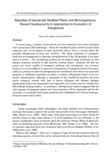Biosafety of Genetically Modified Plants and Microorganisms: Recent Developments in Approaches to Evaluation of Allergenicity
JIRCAS international symposium series
| ISSN | 13406108 |
|---|---|
| 書誌レコードID(総合目録DB) | AA1100908X |

本文フルテキスト
intlsymp-5_1-12.pdf387.25 KB
In recent years, a number of new plants and microorganisms have been developed with recombinant DNA technology. Since the transferred genes code for proteins that ordinarily may not be present in these particular plants, there is concern about the potential allergenicity of these new varieties. The safety evaluation of transgenic foods and microorganisms is relatively straightforward if the allergenicity of the gene source is known. The recombinant product can be assayed using traditional in vitro allergen detection methods or IgE antibody binding assays. Examples for this approach are recent studies of transgenic soybeans and recombinant corn proteins. However, it is more difficult to assess the allergenicity of transgenic plants when genes coding for proteins of unknown allergenicity are transferred, since there is no generally accepted or established procedure to define a protein's allergenicity based on its molecular characteristics. Although a comparison of the transferred protein's structure and/or biological activity with that of known allergens and allergen epitopes (particularly amino acid sequences) is one approach, any results must be confirmed by lgE antibody binding studies. In conclusion, although most evidence suggests that the vast majority of transgenic plants and microorganisms will be completely safe for the consumer, it is essential that proper guidelines are established and relevant tests performed to assure their safety.
| 作成者 | Samuel B. Lehrer Gerald Reese |
|---|---|
| 公開者 | Japan International Research Center for Agricultural Sciences |
| オンライン掲載日 | |
| 号 | 5 |
| 開始ページ | 1 |
| 終了ページ | 12 |
| 言語 | eng |
